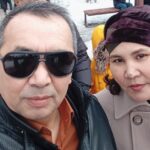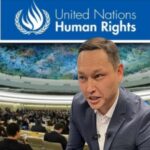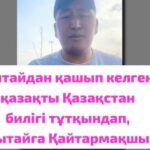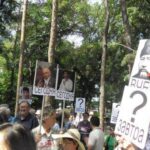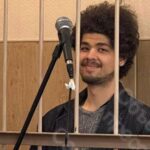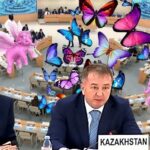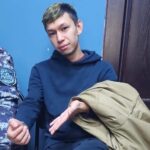Officially, the government of The general message of officials and pro-government commentators is that the establishment of democracy in Establishing a democratic image of Obviously, without certain steps taken towards democracy and without the establishment of its formal institutions, ambitious projects designed to magnify the importance of President Nazarbayev would have been far more difficult to realize. However, the model of democracy being developed in One should warn against a simplistic understanding of what we mean by “cunning democracy”. The cunning here lies not only in the government’s claim that the country is moving towards democracy, while at the same denying its citizens democratic rights. It is also found in the contradictory measures the government takes to promote democracy. This deserves a closer look. It is undeniable that the government of In everyday life, this is evident through the political control of all democratic institutions. This form of control eliminates the risk of political parties, civil society or popular initiatives having any real impact on the political situation in the country. This is the core of what we call Kazakh-style “cunning democracy”. The greatest cunning of all is the country’s Constitution. Or, perhaps more to the point, in the way its norms are realized in practice. Formally based on the Constitution of France, the main legal document of However, the question of whether a state is democratic or not is decided not formally, through normative rights, but in practice – through its social, moral, economic realities and especially its political realities. In A few oppositional papers with small circulation are the exceptions. These papers have been able to find judicial loopholes and avoid official obstacles. Some managed to circumvent the registration process; some bought their license from owners of old papers. However, the activities of these newspapers are associated with a continuous risk of being held administratively, legally and criminally responsible, something that limits their ability to grow and for readers to purchase their paper. At the same time, the fact that they do exist gives the authorities a chance to speak of “alternative views in the media”, and hence to declare that freedom of speech exists in Kazakhstani judges are appointed (directly as well as indirectly through the Senate) by the President and do not enjoy political independence[5]. Twenty years of practice has shown that the judges serve the political interest of the authorities. When a case is politically motivated (trials against political opponents, human rights activists, journalists, and civil society activists) the courts rule in favor of the current political regime[6]. Regardless of the fact that all processes give an impression of a fair trial from a formal point of view, it is impossible to speak of fair trials in Another example of the “cunning democracy” is the constitutional right to peaceful assembly. The constitutional guarantee of freedom of assembly is formally in accordance with the definition found in the International Covenant on Civil and Political Rights (ICCPR)[7]. However, Kazakhstani authorities seriously curb the right of Kazakhstani citizens to meet peacefully and without weapons. The ICCPR permits limitations to the freedom of association, but only as separate exceptions from the general right to use this freedom, without any form of limitation. In Another piece of cunning is the fact that in practically all large populated areas of Another right which has been cunningly stolen from the citizens by the current government is the right to establish political parties. The Constitution states that “Citizens of the The above-mentioned are examples of Kazakhstani authorities’ intent to remove democratic content from the norms of the Constitution, to disavow them on the level of laws and regulations. For this reason, the Kazakhstani state, which externally is seen as democratic, is instead Potemkin villages raised to fool those who do not have the possibility to see the true situation with regards to human rights in A perfect example of this is the realization of the National Action Plan on Human Rights for 2009-2012. On 5 May 2009, the president of Up until During the four years of realization of the National Action Plan, only 23% of the recommendations included in its main chapters have been fulfilled, and only those which are of secondary importance to the fundamental human rights situation. The cunning is to be found in the fulfillment of only those recommendations which do not influence the actual situation. However, it gives the government the chance to speak about how much they are doing to promote democratic principles, pointing to a general “positive tendency” in the realization of the Action Plan. However, out of 14 points in the plan, each of which regards one concrete human right or freedom, the situation with regards to 8 human rights (8 parts of the plan) has remained unchanged, whereas the situation with regards to 5 human rights (5 parts of the plan) has worsened[10]. According to monitoring carried out by human rights activists[11], improvement has only been observed with regards to the rights of the child, while a worsening situation has been noted with regards to respect for fundamental rights and freedoms. Certainly, an improvement of the rights of the child is a very important point. However, this cannot conceal the fact that the situation has worsened with regards to freedom of speech, including peaceful assembly, civil and political rights, the right to freedom of religion or belief and many others. This is a result of one of one the greatest cunnings of the past few years – the realization of the National Human Rights Action Plan for 2009-2012. It is highly unfortunate that hypocrisy has become the main characteristic of Kazakhstani authorities’ attempts at “promoting democracy”. Moreover, under the pretext of bringing democratic institutes into line with the mentality and traditions of the population, these have been transformed into openly authoritarian instruments, through which attacks on human rights and freedoms are being carried out. In the name of the fight against extremism, the authorities crack down on peaceful strikers. While realizing the program “The road to The current governments’ particular cunning lies in the fact that among its achievements it does not consider the welfare of the population, not the production potential of the country, not the level of public health or education, but rather membership and chairmanship in various international organizations, the hosting of international forums and award ceremonies. [2] Ermurat Bapi has been the head of the editorial project DAT, chief editor of the newspaper SolDat since 1998. He was sentenced twice for his political activities: in 2000, he was sentenced to one year of incarceration (later amnestied) and in 2003, received a one year suspended sentence. He was prohibited from “publishing activities” until 2008 and is currently “reader in chief” of the independent newspaper Taszhargan, an independent journalist. http://idwhoiswho.kz/node/2008 [3] Article 33 of the Constitution of [4] http://www.osce.org/odihr/elections/89401 http://www.osce.org/odihr/elections/78714 http://www.osce.org/odihr/elections/kazakhstan/28438 http://www.osce.org/odihr/elections/kazakhstan/18152 http://www.osce.org/odihr/elections/kazakhstan/38915 http://www.osce.org/odihr/elections/kazakhstan/14790 http://www.osce.org/odihr/elections/kazakhstan/14771 http://www.osce.org/odihr/elections/kazakhstan/66676 [5] Article 82 of the Constitution of [6] Galymzhan Zhakiyanov’s, Mukhtar Ablyazov’s, Evgeniy Zhovtis’s, Vladimir Kozlov’s and others trials [7] Article 32 of the Constitution of [8] For example, in Almaty this place is the park behind Sary-Arka cinema; in Astana – areas located near “Gazservice” and “Okan Atriko” buildings; in Pavlodar – area near “Avtomobilist” sport complex; Victory Park in Kostanay and etc. [9] Article 23 of the Constitution of [10] Freedom of Association, Freedom of Religion and Belief, Freedom of Assembly, Freedom of Speech, and the Right to take part in the government of his country [11]
For instance, the Constitution guarantees freedom of speech and the right to unhindered access to information[1]. However, it is impossible to start a TV channel if public officials are of the opinion that the owner of the channel is not loyal to the political regime. Not one single Kazakhstani TV-channel will permit criticism of the current president of the country. The phrase “Nazarbayev should go” has never been heard on television. With a few minor exceptions, the same goes for printed media. A textbook example is the case of the opposition journalist Ermurat Bapi[2], who has tried seven times to register a newspaper, who has been rejected every time for different reasons, and who still has not been able to register.
For instance, in the beginning of July 2013, the chief editor of the journal Adam Reader’s, Gulzhan Yergalieva, stated that the latest issue of the Kazakhstani journal could not be published because she could not find any printer who would print it. One press claimed the rejection was due to technical problems, others said that they did not print publications of a political nature. According to the editor, Adam Reader’s contacted around 24 printers in Almaty and
Another example: the Constitution of Kazakhstan guarantees the right to vote and to be elected, as well as to participate in nationwide referendums[3]. However, no election in
This can hardly be called an achievement.
Cunning democracy
07.10.2013



